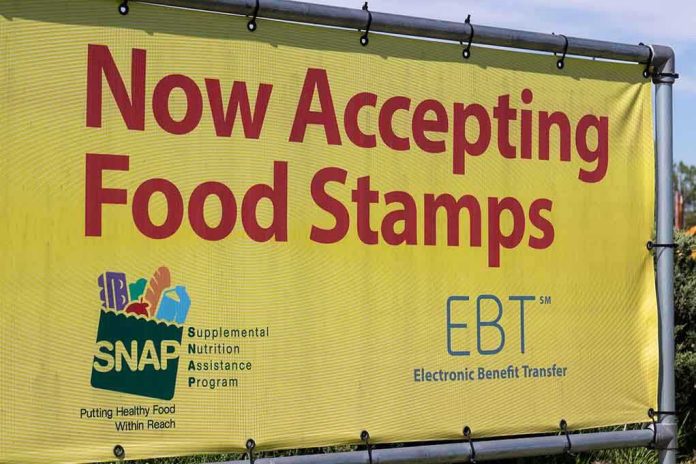
The threat of millions of Americans waking up to empty cupboards and silent EBT cards on November 1 reveals just how brittle our social safety net truly is.
Story Snapshot
- Federal notice warns that no food aid will be distributed starting November 1
- Food banks are already strained by rising demand and fear being overwhelmed
- Volunteers see firsthand the desperation and anxiety growing in communities
- This event exposes the precariousness of food security in modern America
Hunger’s Countdown: The Federal Food Aid Deadline
Volunteers at food banks across the country have watched the lines grow longer with each passing week, a silent barometer of national anxiety. The Trump administration’s public notice that federal food assistance will cease November 1 landed like a thunderclap. For millions who rely on the Supplemental Nutrition Assistance Program (SNAP), this isn’t a bureaucratic hiccup but a looming catastrophe. Grocery budgets across the nation, already stretched, now face a forced starvation diet imposed by political brinkmanship. Food pantries, once considered a last resort, are bracing for an unprecedented surge—one they may not survive.
At food distribution centers, the mood is equal parts resolve and dread. Volunteers recount stories of elderly neighbors quietly asking for ‘just a little extra’ and parents calculating how to stretch canned beans for a week. This isn’t just about hunger. It’s about dignity, about a social contract that seems to be unraveling. The numbers are bleak: over 40 million Americans depend on SNAP. The federal government’s withdrawal, even for a short period, will push many into the arms of already-overwhelmed charities. The ripple effect could reach beyond families to grocers, farmers, and entire local economies, exposing just how interconnected—and fragile—America’s food system really is.
Food Banks at the Breaking Point
Warehouse shelves that once seemed ample now look alarmingly bare. Demand at food banks has spiked, and volunteers know it may skyrocket if federal aid disappears. Many organizations admit they simply cannot fill the gap if government support dries up. Some have started rationing, others have turned away families for the first time in years. For those on the front lines, the fear is not just about running out of food, but about losing faith in the system itself. One longtime volunteer put it bluntly: “We’re bracing for the worst winter in decades, and we’re already out of coats.”
The coming weeks could see a shift from quiet desperation to open crisis. Food insecurity is not an abstract concept; it is a daily, grinding reality for millions. The threat of federal aid disappearing throws into sharp relief just how many Americans live on the edge of hunger. For the food insecure, every day is a negotiation between hope and surrender. The potential halt in aid is not just a policy dispute—it’s a test of the nation’s collective conscience.
The Domino Effect: Beyond the Dinner Table
The reverberations of a federal food aid freeze would echo through communities in unexpected ways. Grocery stores in rural and urban areas alike could see plummeting sales as SNAP dollars evaporate. Local farmers, who depend on food assistance programs to move surplus crops, may face sudden gluts and falling prices. Even healthcare systems could be affected, as malnutrition spikes among vulnerable populations, driving up emergency room visits and long-term health costs. The reach of SNAP is not just a lifeline for individuals; it is a stabilizer for entire regions. Remove it, and the shockwaves are immediate and severe.
Conservative voices have long argued for tighter controls and reduced dependency on federal programs, urging communities to step up through charity and personal responsibility. Yet, the reality on the ground reveals the limits of this philosophy. The sheer scale of need is far beyond what churches and nonprofits can shoulder alone. American common sense values hard work and self-reliance, but even the most industrious citizens cannot conjure groceries from thin air. The current crisis lays bare the necessity—however uncomfortable—of a robust safety net, at least as a backstop against catastrophe.
Sources:
Associated Press: Trump administration posts notice that no federal food aid will go out Nov. 1



